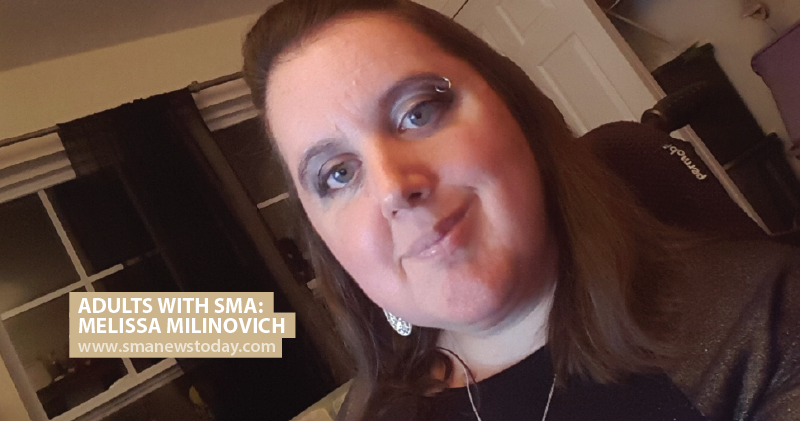Adults With SMA: Melissa Milinovich

Melissa Milinovich is a regular speaker at SMA conferences and uses her social media platforms to educate others about life with SMA. Over the past year, she’s been chronicling her Spinraza journey on her YouTube channel, as well as on Facebook and Twitter. She lives in Amelia, Ohio with her daughter.
Milinovich took some time to discuss her disability advocacy work and family life with SMA News Today.
Kevin Schaefer: First off, tell me about what you do and what your daily life entails.
Melissa Milinovich: I am a contractor for the U.S. government as an IT asset management delivery lead. My daily life consists of working full-time as well as being a full-time single mom to my almost 11-year-old daughter. In whatever time I can find between work and all my daughter’s activities, such as volleyball, I am an advocate within the SMA community as well as the disabled community to ensure our voices are heard in all pertinent issues.
KS: You’ve spoken at SMA conferences and have done other kinds of disability advocacy. How has connecting with others in the SMA community helped you personally?
MM: Connecting with the SMA community has been more about me being there for the younger generation and being a mentor to them. That help wasn’t available when I was growing up. When I was a child and teen, there was literally no one I could talk to about life with SMA or the struggles I was experiencing because of it. I’m hoping the girls I mentor today have an easier time navigating adolescence because I’m here for them to talk to.
MORE: Getting started with the new SMA News Today forums
KS: As a single mother who has SMA, what are some of the biggest factors that have helped you stay independent and manage the challenges of everyday life?
MM: The biggest thing that has helped me is always planning ahead and being as prepared as I can be. My daughter is my mini-me, which means she’s fiercely independent and stubborn (arguing with her is like arguing with myself sometimes), so her being very independent has nothing to do with my having SMA. That being said, I would not be raising her any differently than I am now if I did not have SMA. I feel we are at risk of a generation of helpless adults who don’t know how to do the basics for themselves, so I am raising her to be an example and be independent with age-appropriate tasks.
Furthermore, she is growing up with a unique perspective by having a mom with a disability and it has made her often more empathetic than her peers. She is often the first to help anyone in need and expresses a lot of compassion when peers are struggling. My biggest challenge with being a mother with a disability in general has been overcoming people’s attitudes. Generally speaking, strangers seem to be shocked when she calls me Mommy because it’s as if their brain cannot fathom that a person in a wheelchair has a child.
I have made an effort to have a presence at her school so that perhaps her peers will grow up with a sensitivity and understanding toward people with disabilities that is sorely lacking in today’s society. I am extremely thankful for the school community, especially several parents, who are part of my own personal tribe who assist with things I need help with in helping her to have as “normal” of a childhood as possible. For example, when I go for my quarterly Spinraza injections, I have several Moms who can pick her up from school, help her get her homework done, and give her dinner, all while I am still at the hospital. I can rest assured that she’s taken care of until she comes home. It’s important for every mom to have a tribe, disability or not.
MORE: Using groups in the new SMA News Today forums
KS: You’ve also created a YouTube series to document your Spinraza journey. Where are you in that process now, and what developments have you seen recently?
MM: I have completed five doses so far and I continue to make slow but steady progress in regaining strength. I recently have gained enough strength to help prepare home-cooked meals for dinner, which is something I’ve never been able to do. My channel can be found here. Although it started out as a Spinraza channel, it’s now a mix of my life with Spinraza and my life in general.
KS: What advice do you have for other SMA individuals about entering adulthood and living independently?
MM: The biggest advice I can give is two pieces that actually go together: The first is to never let anyone else dictate your dreams or your life. As long as you remain realistic, the only limitations you have are the ones you place upon yourself. Along with that, it’s extremely important for teens to be very involved in the process of hiring caregivers and relying on people other than family to care for them. I know this makes some parents uncomfortable because they want to give their child the best care possible, but this is an extremely important factor in establishing independence, and an individual having control over their care, who does it, and how they want it done. Starting this process in the teen years makes the transition to adulthood a lot easier.
MORE: Reviewing Ben Mattlin’s new book, where he tackles love and disability
SMA News Today is strictly a news and information website about the disease. It does not provide medical advice, diagnosis or treatment. This content is not intended to be a substitute for professional medical advice, diagnosis, or treatment. Always seek the advice of your physician or another qualified health provider with any questions you may have regarding a medical condition. Never disregard professional medical advice or delay in seeking it because of something you have read on this website.







